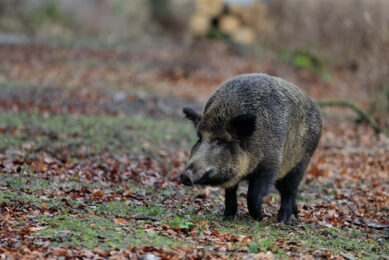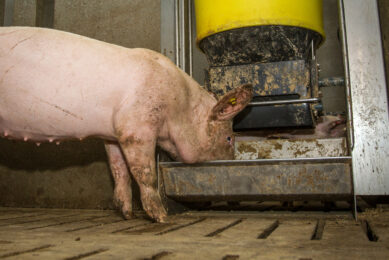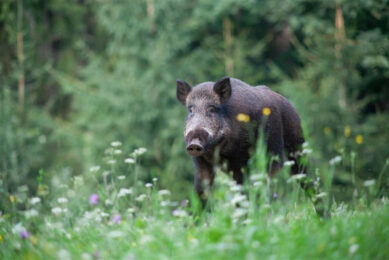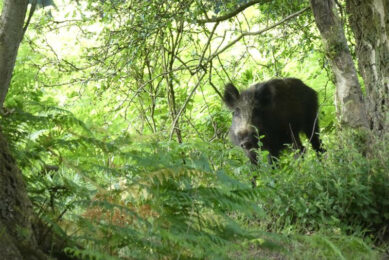Why pigs are the ultimate recycling instruments

Fermented liquid feed – is it just a crazy idea or is it a development which yet needs to be fully embraced? Listen to Professor Peter Brooks and the answer is clear – it should be the latter. Pigs are ideal to process co-products from the food industry.
By Roger Abbott
Pigs and their feeding habits have been a life-long passion for Prof Peter Brooks, who is credited with the identification of the ‘boar affect’ and pioneered liquid feeding and managed to capture the attention of the world with his notions on fermentation.
But it could all have been so different if he had been an early riser instead of a boy who preferred to spend a couple of extra hours in bed in the morning. Speaking from his home near Plymouth in south west England, Brooks, who has done more to revolutionise the feeding of pigs with his ‘crazy ideas’ on liquid feeding than most other people, explains: “I was born on a farm in Warwickshire (England) where I had a choice of getting up to milk the cows at 5 am, or feeding the pigs at 8 am. I am an owl, not a lark and that is how I became interested in pigs, truly.”
Pig research
When the young farmer’s son went to university in Nottingham, he studied under the renowned Dr Geoff Lodge who, he says, ‘inspired me to focus on pig research’. “He encouraged me to continue in this field and to concentrate on practical, down-to-earth research that provided the sort of results that could be used by producers on their farms.”
Gaining a First Class Honours degree in Animal Production, Brooks went on to complete a PhD on the ‘short-term nutritional effects on fertility and fecundity in pigs’ and it was during this time that he also first identified the boar effect on gilts.
“It was all very exciting,” he recalls, and it spawned a number of interesting and practical experiments on pig behaviour, breeding and production which he followed up over the next two years as a Meat and Livestock Commission, post-doctoral research fellow.
Brooks then moved down to the south west of England to take up a position as a lecturer in animal production at the Seale Hayne College in Devon in 1972 (two years later he was appointed head of agriculture, a post which he held for the next 18 years).
At Seale Hayne he completed some ground-breaking work on group housing of sows with electronic sow feeders, as well as biotin deficiency in pigs and the water requirements and drinking behaviour of pigs.
Liquid feeding
But how did this all lead on to his ground-breaking work on liquid feeding? When he arrived in the South West, Brooks found that liquid feeding was common in the area due to the availability of milk co-products.
He says, “It seemed a sensible proposition to me, because handling and transport of these products was easier and more cost-effective in liquid form, so I persuaded the college’s farm manager to switch over to liquid feeding too. Liquid feeding also provided us with a cost-efficient way of using valuable co-products from the human feed industry in pig diets, especially as the cost of drying these products or of disposing of them in an environmentally acceptable manner was always rising. Adding value to them by fermentation and processing them through the pig can be a very profitable and green solution.”
And even though Brooks has now retired as the head of the School of Biological Sciences at the University of Plymouth, where he was made Emeritus Professor of Animal Production, he is keeping himself busy investigating how pigs can be an effective part of the global food sector’s environmental programme. This is an area which is becoming more important every day as consumers become more aware of the industry’s carbon footprint and the need to reduce greenhouse gas emissions to combat climate change.
Although many companies are already taking action on this front with efforts to become more sustainable and reduce carbon emissions, Brooks believes that pigs could play a vital role in helping ensure these projects are cost-effective. He says, “The pig is the ultimate recycling element and can provide the food processing industry with an invaluable and cost-effective means of recycling co-products and adding value to them, especially, I think, if my latest ‘crazy idea’ – fermented liquid feed – is embraced by the pig industry.”
Fermented liquid feed
Brooks says, “It really is very interesting, because not only does it help save costs because one can co-ferment fairly low-value products and combine them to produce an added value feed – and fermented liquid feed increases digestibility and reduces pathogens in the pig. It also reduces the amount of nitrogen and phosphorus coming out the back end of the animal.”
He realises this ‘idea’ could take some time to develop into a cost-effective on-farm system because it needs co-operation between the food sector and the pig industry, especially as it needs ‘a lot of control’ and a whole new skill set that is not usually found on pig farms.
“In any case, it would probably be much more cost-effective if the liquid feed was fermented in a food processing unit which could apply food standard quality control off-farm and then transport to FLF pig units.”
He continues to say, “I believe this could really hold some benefits for the environment as well as for large pig producers, but we need to stitch it all together with the food processors and partners who have the nutritional know-how to help us produce a high-value product.”
He said one international feed company, the Dutch producer of animal nutrition, fish feed and processed meat products, Nutreco, was already pioneering the use of fermented liquid feed on a small number of big units in the Netherlands and east Germany.
“It has taken my team at Plymouth University some ten years to identify the right sort of bugs that produced the right results, but we now have the beginnings of what looks like a very, very exciting project, especially as we can adapt the process for the poultry industry, as well,” said Brooks, who is leading a small team of scientists researching this project.
“I think fermenting liquid feed from the food industry will eventually become a normal procedure for ‘big’ pig producers and I am sure we will see more liquid feeders in the pig industry in future on the larger commercial units.”
Brooks feels that there is now a gap in the market for somebody to set up a turnkey fermented liquid feed operation for smaller producers. Concluding, he says, “Somebody, probably in the Far East where there is more understanding about fermented feeding, will be able to pick up this idea and develop a much simpler system to produce fermented liquid feed and lower-cost liquid feeding equipment for small units. It really does make sense and I hope big and small producers will all be able to enjoy the advantages of feeding fermented liquid feed to their pigs in the not too distant future.”
[Source: Pig Progress magazine Vol 30 nr 7, 2014]
BIOGRAPHY
Professor Peter Brooks gained a First Class Honours degree in Animal Production at the University of Nottingham, UK and completed his PhD. He joined Seale-Hayne College in 1972 as a lecturer in Animal Production. Two years later he became Head of Agriculture, a post which he held for 18 years during which time the college became part of the University of Plymouth, UK. With senior posts including director of the Food Technology Transfer Centre, head of research and associate dean and he was awarded a personal chair in Animal Production in 1991. He retired in 2009 as head of the School of Biological Sciences at the University of Plymouth. During his research career he focused on e.g. the effect of nutrition on reproduction and the water requirements of pigs before turning his attention to liquid feeding. He pioneered the use of ESF in group housing of sows. He has also been involved in research on the behaviour and welfare of pigs under different housing systems.











